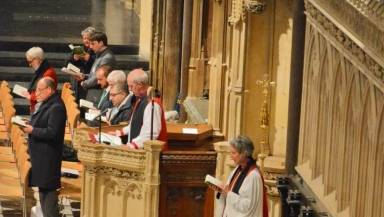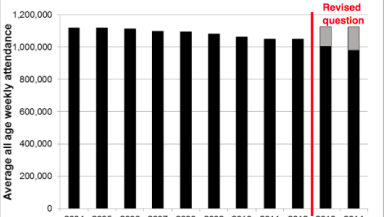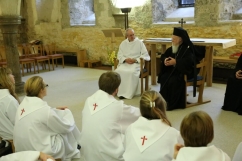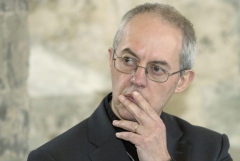
The number of people attending Church of England services each week has fallen below one million for the first time, according to new figures published today.
The Church of England statistics for 2014 show that just under one million people attended services each week. The statistics reveal that more than 24,000 former worshippers in the Church of England either died, or simply decided to stop going to church. Of the remaining 980,000, just 830,000 were adults.
The big festival services remained strong, with 2.4 million attending a Christmas service and 1.3 million showing up at Easter. In addition, 2.6 million attended special Advent services for civic organisations and schools.
The decline was not unexpected.
In his speech to the Primates meeting in Canterbury yesterday, the Archbishop of Canterbury addressed the problem. He said there had been a change in counting the numbers that was partly responsible. This was the removal of school services from the figures. He admitted also that the Church of Enland's hostility to gay marriage had cost it dear. He said: "In some parts of the Communion decline in numbers has been a pattern for many years. In England our numbers have been falling at about one per cent every year since World War II."
He referred to the new figures as continuing the pattern, "made to look a little worse by a change in the way we count people."
He added: "We are exempted from the same sex marriage act, showing that our voice is still heard against the prevailing wind of our society, and at much cost to ourselves, by the way."

The Marriage (Same-Sex Couples) Act became law in 2013.
As Archbishop Justin Welby's words indicate, the Church of England considered it a victory that it managed to secure an exemption in law that would take further Parliamentary legislation and agreement of the Church itself ever to overturn.
Overall, the Church of England has lost more than one in ten of its members in the last decade, with an average decline of one per cent a year.
The Bishop of Norwich Graham James, said: "The 2014 figures are not in any way a surprise. While the recent trend of the past decade continues, it has been anticipated and is being acted on radically. As part of a prayerful and considered response to these trends the Church is embarking upon the biggest renewal and reform process in over 150 years focusing our resources on prayer, evangelism, discipleship, vocations, leadership and training."
He said the Church lost many people to death each year, about one per cent of its members. Given the current age profile of the Church, this is likely to continue.
"As a Church we are unashamedly committed to following the teachings of Jesus Christ in our worship of God, discipleship and service to the poor and the marginalised. Our confidence, resilience and service is rooted in Jesus.
The story is not one of inevitable decline. During 2013-14 some dioceses continued to increase their attendance.
"In the past 12 months alone there are examples of growth and new churches across the country. In my own diocese the church of St. Thomas Norwich has grown from 50 to 450 people in the past two years. In Bournemouth, St Swithin's – a church which started in 2014 – now sees 500 people attending every week whilst in Birmingham St Luke's Gas Street is already attracting hundreds of young people since its beginning in 2015. There are many others like these and each is a sign of hope."
"Attendance statistics do not tell the whole story," James continued.
"There are many things that churches do that are not included in these data from running homelessness services and hosting foodbanks, to educating a million children a day in our schools to providing welcome and accompaniment to the least, the last and the lost in our society."
The figures contrast hugely with the 25 million members claimed for the Church of England by the World Council of Churches. It is the 25 million figure that is counted in the oft-repeated claim by the Anglican Communion to have 85 million members worldwide.















